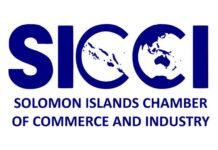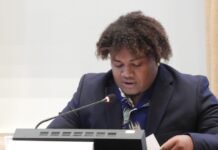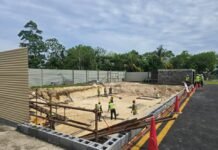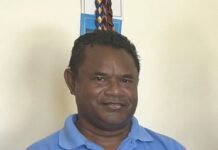
PERMANENT Secretary of the Ministry of Education and Human Resources Development (MEHRD) Dr Franco Rodie says our country needs a robust and equitable education system that can shape the future of our people.
He shared this at the first plenary session of the International Education Conference on the topic of; Rethinking Implementation of the Education Legislative Framework as a tool for furthering Reform in Solomon Islands: Creating a better future for our young generation.
In his presentation, PS Rodie discussed the theoretical perspective of the importance of the Education Framework in the Education system and provides a snapshot of the provisions of the Education Act 2023 and its subordinate documents.
In highlighting the importance of the Education Legislation, Dr Rodie said education is the bedrock of our nation’s prosperity, societal development and individual growth, hence to achieve our goals; “we need to adopt a robust and equitable education system – one that can shape the future of our young generation and citizens,” he said.
Dr Rodie said in response to this, the national government, through MEHRD with, support of development partners especially the Australian Government has invested substantial resources in developing the Education Act and the subsidiary legislative documents to guide our schools and early childhood education centres offer education and training to our children and students.
He also informed the conference participants that our Education system is undertaking a significant and exciting period of reform and change. At the forefront of this is the legislative reform under the new Education Act passed in 2023. He reiterated his view of the advantages of education as a tool for achieving a better life compared to the past. He said that it is also about, attainment of worthwhile skills and knowledge and living in peaceful coexistence with one another and, more importantly with the climate change.
He added that based on the new Education Legislative Framework, reforms are being undertaken to modernize a range of requirements in relation to enrolment, attendance and participation of students.
He said that there are even requirements made in the policy for the delivery of distance education to ensure students who access it receive a quality education program and schools have greater guidance to support its delivery.
PS Rodie explained that one of the challenges in the implementation of the new Education Legislative Framework is the mismatch between the intent of the legislation and how it is implemented and actioned to reform and improve our education system.
He said unless there is direct connection in terms of the actions taken to implement the legislative framework and policy as intended and linked to the classroom, where teaching and learning is at work, and are sufficiently resourced both financially and in terms of human capacity, efforts to achieve the goals for education reform are doomed to fail.
PS Rodie in his presentation also provided details of the new Education Act 2023.
He said the new Education Act (2023) has been written to address the well-researched challenges and blockages to the sectors and thus to reform the education system.
Within this Act there is legal status given to a collective of documents required to administer the system and together these documents are called the Solomon Islands ‘Education Legislative Framework’.
The Act is intended to provide the legal basis of a more effective education system for the early childhood and schools sectors.
Both the Education Act 2023 and its associated Administrative Instructions address various aspects of devolution that have long been desired by Provincial Governments – the need for more decentralization of education services in the provinces and communities.
The Education Act 2023 provides for the establishment of the Solomon Islands Education Board, which has an advisory role for the Minister and Permanent Secretary.
The new Act also provides for the establishment of Provincial Education Boards whose functions, among others, will be to plan for the needs of the provider and improve coordination between the education providers operating schools within that province.


































